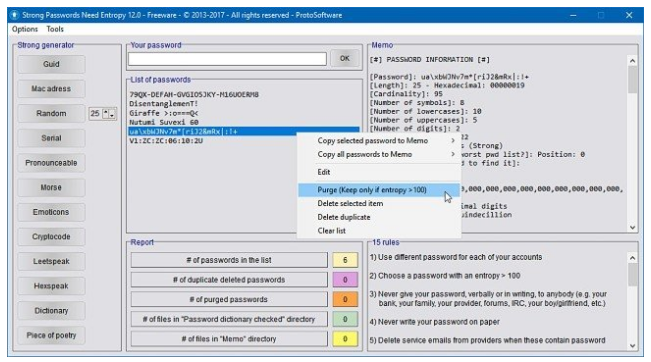
#Password entropy password#
Systems that use passwords for authentication must have some way to check any password entered to gain access. However, this is inherently insecure because the person's lifestyles, entertainment preferences, and other key individualistic qualities usually come into play to influence the choice of password, while the prevalence of online social media has made obtaining information about people much easier. All items in such lists are considered weak, as are passwords that are simple modifications of them.Īlthough random password generation programs are available nowadays which are meant to be easy to use, they still usually generate random, hard to remember passwords, oftentimes resulting in people choosing to implement their own. Such lists include the numerous online dictionaries for various human languages, breached databases of plaintext, and hashed passwords from various online business and social accounts, along with other common passwords. In addition, lists of commonly chosen passwords are widely available for use by password guessing programs. Only rough estimates of strength are possible since humans tend to follow patterns in such tasks, and those patterns can usually assist an attacker. Typically, humans are asked to choose a password, sometimes guided by suggestions or restricted by a set of rules, when creating a new account for a computer system or Internet Web site. While the strength of randomly chosen passwords against a brute-force attack can be calculated with precision, determining the strength of human-generated passwords is challenging. Passwords are created either automatically (using randomizing equipment) or by a human the latter case is more common.


three) of failed password entry attempts. Some systems impose a time-out of several seconds after a small number (e.g. The rate at which an attacker can submit guessed passwords to the system is a key factor in determining system security. The first factor is the main focus in this article. The effectiveness of a password of a given strength is strongly determined by the design and implementation of the factors (knowledge, ownership, inherence).

Using strong passwords lowers overall risk of a security breach, but strong passwords do not replace the need for other effective security controls. The strength of a password is a function of length, complexity, and unpredictability. In its usual form, it estimates how many trials an attacker who does not have direct access to the password would need, on average, to guess it correctly. Password strength is a measure of the effectiveness of a password against guessing or brute-force attacks. Enabling more character subsets raises the strength of generated passwords a small amount, whereas increasing their length raises the strength a large amount.

Options menu of the random password generation tool in KeePass.


 0 kommentar(er)
0 kommentar(er)
